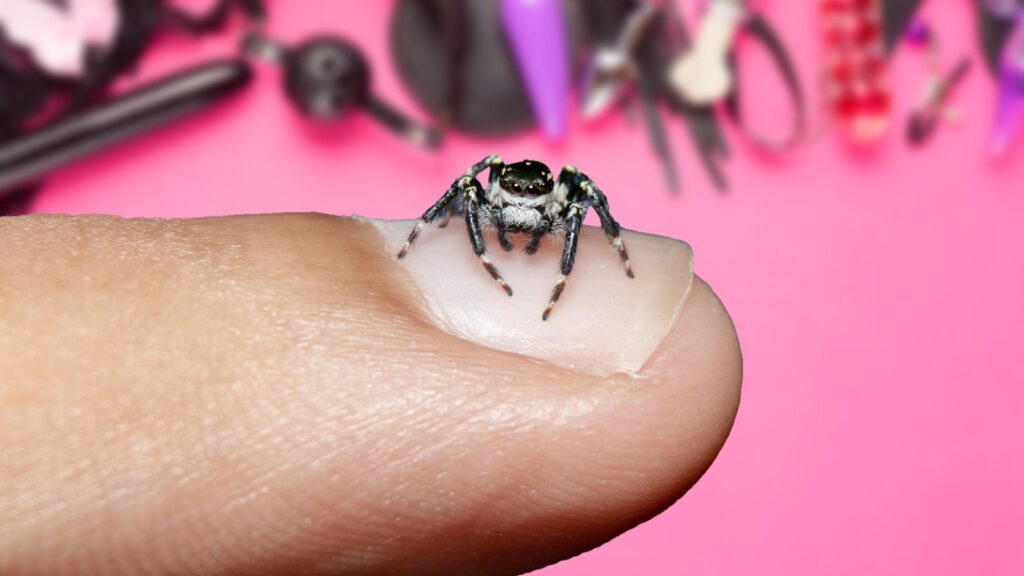
What’s the Drama in BookTok’s ‘Monster-F-cker’ Erotica Community?
Move over leading men. One of the biggest mediums in TikTok’s book community has a different romantic north star, doubling down on the tall, handsome, and extremely dark. Introducing: the Monster-Fuckers.
There are dozens of online fandoms dedicated to romance and erotica. But on BookTok, authors who write romance books about monsters, aliens, or half-human, half-insect creatures have found a growing community. Their readers are ravenous, not just for work that involves sexy monsters, but to discuss and recommend books without the shame that often accompanies erotic writing. The tags always differ, but they’re usually marked as #monsterlovers, #monsterfudgers, or “spicy” books, all code terms used to get past TikTok’s content censors. But the grassroots nature of the fandom means there’s major drama—and even bigger questions about author responsibility and community policing in the self-publishing world.
Monster-Fucker Drama
One of these popular authors is Tiffany Roberts, the pen name of husband and wife writing pair Tiffany and Robert Freund. Under the Roberts byline, the couple has self-published dozens of popular romance novels featuring monsters and half-human, half-animal anti-heroes. But the series BookTok has become focused on is The Spider’s Mate, a three-book collection (Ensnared, Enthralled, and Bound) that details the story of Ivy Foster and her vrix (anthropomorphized spider) mate Ketahn.
But almost a year after the release of Ensnared, another romance author, Melissa Blincoe, published her own story about a sexualized half-human half-spider, titled Heart Throb. Fans of Roberts began to raise some red flags about possible similarities, and sparked a controversy over where the line is between inspiration and outright imitation.
The couple behind Tiffany Roberts declined both an interview and request to comment from Rolling Stone. But according to a statement published on the Tiffany Roberts official Facebook page last month, Blincoe directed messaged the Freunds’ and asked which artist they had commissioned for the cover of Bound, the second Spider’s Mate novel. When her book was released, the Freunds said several fans contacted them about the striking similarities in scenes and terms in both their series and Blincoe’s work. The two added that Blincoe has pursued artists they’ve previously worked with, including their audiobook narrator, and asked for art extremely close to their own.
Since then, the couple has alleged that Blincoe, in using similar promotional blurbs, scenes, and artwork for her spider series, has purposefully borrowed from The Spider’s Mate, encouraged false reviews and legal threats against the writing pair, and falsely accused them of harassment.
“It seemed that for every art piece we’ve commissioned for our characters, Mrs. Blincoe has commissioned one that is uncannily similar,” the Freunds said in the statement. “While there was clear evidence of her borrowing from Ensnared when it comes to Heart Throb, there was no word-for-word copying, and it wasn’t plagiarism. There was nothing we could do.”
Blincoe, who has denied allegations of copying from Ensnared, has maintained that the only similarities in the books are their humanoid spider characters. In a statement to Rolling Stone, she says that she started writing Heart Throb before she read the Tiffany Roberts arachnid series but was blocked and left on read after asking if the Freunds had a problem with Heart Throb’s cover. Following the backlash, she removed Heart Throb from Amazon completely, a move Blincoe says prevents her from re-editing it.
“If she would’ve reached out, all of this could have been resolved. I could’ve gone over my book with her to see what needed to be changed,” Blincoe says. “For the artists, I used her art for one reference photo, then used shutter stock photos and other references from then on out. I have commissioned many artists that [Tiffany Roberts] have not worked with.”
The Freunds have acknowledged that in the small community of monster romances, similarly themed characters can often crop up. But the two say they have supported plenty of authors that write spider-smut books and only object when there are glaring similarities. They also add that they have never encouraged harassment towards Blincoe and have asked their readers several times to avoid leaving hurtful comments.
“Anyone can write a spider hero. The more the merrier! But one thing of note is the differences between our Vrix [the term for their spider character] and all the spider heroes in everyone’s stories (and the elements and plots of those stories),” the Freunds said. “We’ve never once asked anyone to attack someone whether on our behalf or otherwise, and never would.”
But Blincoe maintains that she is still facing harassment from fans of the Tiffany Roberts books, even on works that haven’t been accused of anything— harassment she says the Freunds have “allowed” to happen.
“I have been dealing with their fandom harassing me, one starring my preorders to tank my ratings when I know they haven’t received an ARC, and leaving awful comments in my TikToks from months ago,” Blincoe says. “Now, they are converging on my Zxalian Mate arachnid series, accusing it of plagiarism when there is no similarities to Ensnared at all. All of this is extremely sad. I used to adore these authors. But my side never gets told because their side has a large fandom. It breaks my heart that all of this could’ve been avoided if she had given me a chance to explain”
Self-Policing in the Self-Publishing World
The drama between the Tiffany Roberts and Melissa Blincoe books might seem niche. But it brings up a new issue in the monster romance community: self-policing. In the publishing industry, a book is expected to be checked thoroughly for errors and can go through rounds of editors. But online, where ebooks are sold on marketplaces like Amazon, even practices like beta-readers (who are paid or volunteer to edit indie works) can make mistakes. The author shoulders all the responsibility for writing, promotion, editing, and fact-checking, a system that can leave self-published works susceptible to bad actors.
Those aware of the gaps in the system will often pirate popular books, best-selling romance author Ruby Dixon tells Rolling Stone. Dixon, the mind behind the bestselling erotica series Ice Planet Barbarians, says the ease of self-publishing tools can make book piracy pretty common.
“Because it’s easy to publish online, it’s also easy for someone to pirate your book, toss their name on it, and try to steal your royalties,” Dixon says. “It’s so commonplace amongst the author community that it can get downright discouraging.”
According to Australian monster romance author Opal Reyne, this common occurrence means that fans have begun to feel responsible for policing works they feel cross the line into plagiarism. While this can often lead to false accusations or harassment, Reyne says the positive aspects of publishing online, including avoiding rejection from traditional U.S. publishers, outweigh potential negatives — especially for authors who encourage their fans to leave copycats alone.
“Readers will point [plagiarism] out when it’s obvious and alert the offended author so they can deal with it — and it’s our choice on what we do from there,” Reyne says. “Any author that does blatantly copy should be looked at very carefully, as it’s very disrespectful to take someone’s intellectual property when they have worked very hard to be unique. But I don’t condone harassment.”
Stigma Against Erotic Writers
There’s also discourse between monster romance readers and writers about where they fit in the larger BookTok community. According to Katee Robert, a popular monster romance author who’s written over 65 books, self-published works are often seen by mainstream readers as books that weren’t good enough to get traditionally published. But Robert tells Rolling Stone that the popularity of online works has actually carved out a space for more diverse authors, artists, and books to shine — while taking home a bigger cut.
“Self-publishing [fills] the gaps that traditional publishing seems intent on ignoring. It’s where niche genres thrive and marginalized authors are able to find their audiences and tell the stories they want to tell, without having to water it down for a ‘wider’ (A.K.A. whiter, straighter) audience,” Robert says. “People are on the cutting edge of what readers want.”
While a number of popular authors have built up monster-romance fans into a thriving subsection on BookTok, they’re still concentrated on dismantling the stigma that comes with writing sexually explicit material.
“Even with the strides that have been made in the last couple decades, there’s still a lot of shame- coding that comes from fully embracing sex, and we see that play out in romance as well. People like to read it, but they don’t necessarily want others to know that they’re reading it unironically,” Robert says. “There was a time in my career where I would happily point out that romance, as a whole, is doing some really heavy lifting when it comes to conversations about pleasure of all parties involved, consent, and protection. But these days I’ve stopped trying to justify my genre to those dedicated on misunderstanding and demonizing it.
And Dixon, whose Ice Planet Barbarians series is now firmly considered a mainstream-BookTok darling, says that even with the blowback romance writers receive, the fact that the Monster-Fucker community is continuing to thrive proves that when shame is removed from the equation, people can find books they truly enjoy.
“I think we’re seeing a lot more ‘fringe’ romance because the community is basically saying ‘Yes, it’s okay that you like this thing. It’s just fiction and that makes it a safe place to explore fantasies,” Dixon says. “ It’s absolutely wonderful. No kink is shamed, and if you ever show up with a request, no matter how weird, someone can help you find a read to scratch that itch.”



